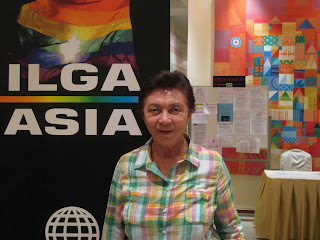Gloria Careaga, ILGA Co-secretary General at the 5th ILGA Asia Conference in Bangkok
Interview with Gloria Careaga Pérez who is a long-time feminist, LGBTI activist and social psychologist and currently serves ILGA as Co-Secretary General.
--- Is this your first time in Bangkok?
No. This is my second time.
--- How’s your second time in Bangkok?
I am very happy to be at the ILGA-Asia conference. Unfortunately, I haven’t had any time to go out. When I was here for the first time 5-6 years ago, I got to see temples. I am very happy to see the Asia region evolving and increasing numbers of people who have come to the conference. It gives me a lot of hope and enthusiasm.
--- Gloria, you are from Mexico. You’ve been involved with LGBTI movement in Latin America and Caribbean. Can you share with us the general LGBTI situations in your region?
Latin America has been growing relatively easily because LGBTI people or behaviors are not criminalized in most of the countries in the region. Main problem is criminalization of homosexuality in Caribbean countries due to the influence of colonization by British Empire.
In some of the Latin American countries, we used to military occupancy and people had a very big fight against this totalitarian organization. People fought for democracy and human rights. These experiences brought us in the region us specific pictures, perspectives and tools that some people in other regions do not have in order for us to demand protection of human rights.
Latin American region has been proactive within ILGA. Our challenge is to maintain critical view and to remain very active within the organization.
In my view, different countries in Latin America have different situations. I mean, there are some governments that call themselves “revolutionary” or “leftist“ These countries are Venezuela, Nicaragua, Ecuador and Cuba that often come together fighting against capitalism. But they haven’t really reached a clear position on LGBTI issues. We still have these countries that are not fully committed or don’t have clear political view on our rights.
Other countries in the region are much more open and have clearer position in favor of our rights. So, that makes it easier for us to work. In my country, Mexico, we had a conservative party in the government for twelve years but it’s over now. We expect that things will become much better. I must stress though that there’s still a lot of work to be done in Latin America and Caribbean. We need to change not only the governments, laws and public policies but also sexist and patriarchal culture that remains in this region.
--- Can you tell us, LGBTI folks in Asia about how ILGA works?
Sure. I understand that it’s not clear what ILGA is that for many people. Some people might see international organizations as a funder or somebody who would support your work financially. But ILGA is not that kind of organization.
ILGA is a membership-based association consists of more than 1000 organizations from all over the world. We are very proud of that. We are a big umbrella under which we all work together to work for the protection of our rights and to exchange among us experiences, strategies and needs to define plan of actions.
ILGA has been organized in six different regions and these different regions send two representatives to the world board. Besides regional representatives, Women’s Secretariat, Trans Secretariat, Intersex Secretariat and two Co-Secretary Generals compose the board and work to define how we are going to develop plan of actions which have been approved by the world conference which the ILGA’s general assembly held every two years.
We decided to have six different regions in ILGA because the needs and the challenges of every region are very different. Every region defines their own agendas and strategies for the protection of their rights. We are diverse not only in our sexualities and identities but also in our economic, geographic, cultural and other situations. The specificities of each region bring ILGA a better-respected of the group and this really enriches the association.
--- Tell us about the workshops at this conference that interested and impressed you.
For me, it was very interesting to be in the discussion on the plan of actions. In the workshop, I saw people who were really thinking about situations, obstacles and possibilities that ILGA can reach in next years. The workshop gave me an opportunity to understand the LGBTI situations and future in Asia.
--- You’re leaving tonight for the regional conference in Brazil. What do you expect to happen in Brazil? (Learn about “regional conference in Brazil” at a blog post “ HYPERLINK "http://ilgatheraisingphoenix.blogspot.jp/2013/03/towards-new-sogi-resolution-at-un.html" Towards New SOGI Resolution at UN.”)
It’ll be an opportunity to see the UN capacities on LGBTI issues. I hope that we’ll have many government delegations that would participate deeply and are committed.
I’m afraid that a particular situation happening in Brazil, which is about the priest sitting in their Human Rights Commission, might make some noise against the meeting. I do hope our presence, activists from different countries will bring not only hope for the LGBTI work at the UN-level but also for an opportunity for Brazilians to pressure their government about the situation.
Overall, I am enthusiastic. We’ve been very well-prepared for the meeting. We know what we are going to do. We know the situation in Brazil. I believe that we’ll make a new step in favor of our rights.
(This interview was conducted during the 5th ILGA-Asia conference in Bangkok by Azusa Yamashita, Gay Japan News, Japan.)


No comments:
Post a Comment